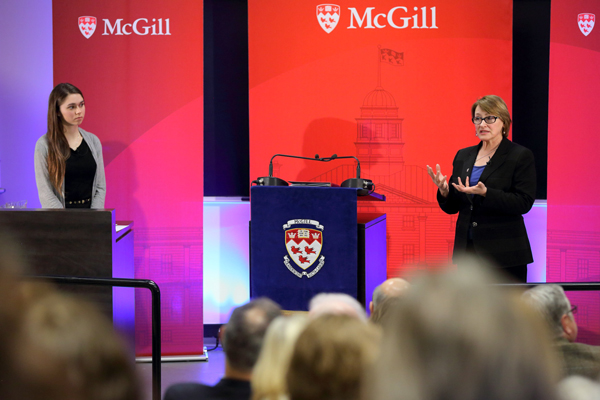
By James Martin
In her major address to the community, Principal Suzanne Fortier outlined five priority areas for the coming years — and specific actions for realizing “a vision for McGill that comes from this community and belongs to this community.”
“We are united by the privilege of being part of a great and unique university in one of the world’s most creative cities,” Principal Suzanne Fortier said by way of welcoming a capacity crowd to Room 151 of the Bronfman Building on Friday, March 28, 2014 at noon. (The event was also Webcast live.) Since becoming Principal in September, she explained, Professor Fortier has “had the opportunity to meet with many of you and participate in many activities. This has helped me crystallize the hopes, the goals, and the ambitions of this community.”
Building on what she calls “the tremendous amount of work that has been done here to shape the future of our University,” including new academic and research strategic plans, Principal Fortier proposed “five priorities on which we can mobilize our energy, effort and resources and continue to build an open, connected and purposeful McGill. These priorities have emerged from conversations and consultations with many of you and the constructive and wise advice you have generously offered.”
Three of the priorities relate to the University’s mission: student life and learning, research and engagement with society. The fourth and fifth priorities focus on strengthening our workplace and our physical and virtual campus. You can read the full text of the Principal’s speech, which includes specific courses of action, here.
Moderator Kaitlin Lloyd, a bioresource engineering student at McGill’s Macdonald campus, then opened the floor — and the Web — for 40 minutes of questions.
A Twitter user asked what the Principal plans to do to “make McGill University a more transparent and accountable institution.” “I think that one of the ways we can increase accountability is to simplify some of the at times complex processes,” responded Principal Fortier. “Convoluted processes can, in fact, diminish accountability, so this is one area that I think we can achieve two goals…more accountability and more transparency, because people will have a better sense of where locations of responsibility reside.”
A graduate student wanted to know the relationship between university-military research partnerships and the Principal’s belief in the importance of “being united by shared values and goals, and about a sense of responsibility for bettering our world.”
“Many of the research that has been done with government and military partners has led to developments that improve society,” responded Principal Fortier, who cautioned against putting all of the Canadian military’s duties, which, significantly, includes aiding civilians during natural disasters, in the same category. “But it is important, as you engage in these collaborations, to stay true to your values and your principles. It’s important to ask yourselves these questions.” She mentioned a detailed formal process, currently being designed in the office of the Vice-Principal (Research & International Relations), “that allows us to ask these ethical questions before signing contracts.”
One of the coordinators of the Vision 2020 project asked how the Principal sees the five priorities relating to McGill’s vision for a sustainable future. “As we think of the campus,” replied the Principal, “and that includes both the physical campus, and the virtual campus of information and communication technology infrastructure, one of the principles is sustainability. In all that we do, we need to challenge ourselves against that test.” As an aside, she congratulated the Vision 2020 team on their newly unveiled Sustainability Strategy, which, she said, “as a community we can all be very proud of.”
A coordinator of Kanata noted the growing interest at McGill in indigenous issues, including the introduction this fall of an indigenous studies minor. “It’s important for us to follow your guide,” said Principal Fortier. “The student and the employee communities are the best for telling us what’s important on campus. It’s important that the Aboriginal community feel welcome and respected on our campus. As Canadians, we have a lot to learn about the Aboriginal peoples and their cultures. I don’t think I’m well-placed in the central office at the University to tell you what we need — I need to hear from [all of] you.”
The Principal also addressed questions regarding the use of new technologies to remain relevant and cutting-edge, maintaining the McGill “wow factor,” the development of new entrepreneurship and teaching certificates in an effort “to offer students more than just an education in their own disciplines,” and the growing importance of collaborating with other universities. A video recording of the entire question period, and the Principal’s address, can be found here.
“I met with some McGill alumni in New York City earlier this week,” said Principal Fortier at the end of her address, “and they gave me the perfect elevator pitch for McGill: ‘McGill is a bunch of smart people doing amazing things and delivering results.’ That was how they defined McGill after reflecting about their experience here a few years after their departure — and that’s how I think we should continue to define ourselves. Our openness to change, I believe, will determine our future success. I welcome the comments and suggestions you’ve given me throughout my first six months at McGill, and I look forward to working alongside you to help this vision take shape. I think we’re ready to move to action.”
